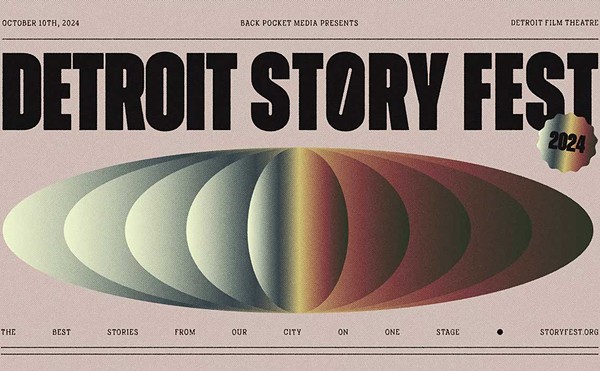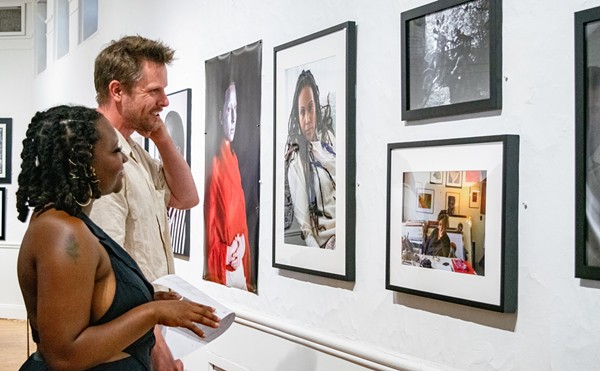Since Detroit Docs launched in 2002, the independent film festival has been run by a number of individuals and organizations, but its mission to promote documentaries and foster work by local filmmakers has remained unchanged. The sixth Detroit Docs International Film Festival, starting tonight and running through Sunday, has streamlined and sharpened its focus, maintaining important alliances and securing an ideal home base at 1515 Broadway, the intimate multimedia space across from the Detroit Opera House.
In the movie marketplace, documentaries are both exalted and marginalized, prized for their ability to inform and entertain, yet dismissed as box office lightweights, with even influential hits like An Inconvenient Truth (2006) only attracting a fraction of the audience of fiction films. But the actual value of documentaries, to crystallize ideas and stir dialogue, can be measured in films like this year's Detroit Docs opening night presentation, the prescient I.O.U.S.A.
Part real-world budgetary primer, part call to action, I.O.U.S.A. follows a group of low-key town criers, including U.S. Comptroller General David Walker, as they traverse the country on a Fiscal Wake-Up Tour to sound the alarm about our nation's debt denial and credit crisis. Using pithy graphics and succinct historical summations, along with interviews with major financial players like Warren Buffett, director Patrick Creadon (Wordplay) expertly reveals the economic elephant in the room.
I.O.U.S.A. screens free tonight at 1515 Broadway (7 p.m.), and opens theatrically this Friday, Oct. 31, at the AMC Forum 30 in Sterling Heights.
Detroit Docs moves to the Detroit Institute of Arts for An Evening with Les Blank on Thursday, Oct. 30 (7 p.m.), continuing the cooperative effort established last year with the Detroit Film Theatre program and Wayne State University Department of Communication to bring an influential documentary filmmaker to the DIA for a retrospective screening, followed by a question-and-answer session.
Blank is a master of the less-is-more approach, a keen observer and patient listener. His films pull audiences not only into the physical world of his subjects, but into their mind-sets. In Garlic is as Good as Ten Mothers (1980, 51 min.), he takes a seemingly prosaic subject — the globally consumed "stinking rose" — and creates an immensely witty exploration of how our eating habits affect our inner lives.
Werner Herzog Eats His Shoe (1979, 22 min.) finds the outspoken German filmmaker making good on a pledge to Errol Morris that he'll feast on his footwear at the premiere of the novice's first documentary, Gates of Heaven. Much more than a behind-the-scenes doc, Burden of Dreams (1982, 94 min.) is an amazingly sober look at Herzog's heart-of-darkness journey into the Amazon jungle, a stunning chronicle of cinematic hubris and Sisyphean setbacks in the uphill battle to complete the epic film Fitzcarraldo.
An additional program of old and new Les Blank films will be shown at 1515 Broadway on Sunday, Nov. 2 (4 to 7 p.m.). A selection of early shorts includes Blank's first student film, the swirling psychedelia of a 1967 love-in, and portraits of his musical heroes like Dizzy Gillespie. Even with all this looking back, Blank is still very much in the game today. All in This Tea (2007, 70 min.) is his first digitally shot documentary, following connoisseur David Lee Hoffman to China to locate the few artisans left who craft handmade tea in a country that increasingly embraces mass-production, even at the expense of its own cultural heritage.
Although the special events often garner much of the attention, it's the competition films that are at the heart of Detroit Docs, with 26 shorts and 19 features (50 minutes or longer) screening over three days. They begin on Friday, Oct. 31, with two international programs (5 and 8:30 p.m.), whose portraits include an Iraqi family and embedded American cameraman, a Norwegian BASE-jumper, a Canadian stand-up comedian facing cancer, and a retiree who pushes a walker with the sign "Arrest Cheney" through the streets of New York City.
On Saturday, Detroit Docs continues on two fronts. It's back to the DIA with a selection of Made in Michigan short films (1-3 p.m.) that are heavy on nostalgia, with a strong streak of optimism. Several films document abandoned structures (like Michigan Central Station, symbol of Detroit's lost grandeur) or tell family histories, past and future, such as Elizabeth Greene's Grandma's Pharmacy (30 min.) or Sean Hages's Baby Time (13 min.).
Shaking up expectations is at the core of It All Adds Up (30 min.), about the summer Math Corps program that improves the skills of at-risk Detroit students, from Oscar-winner Sue Marx, Allyson Rockwell and Bob Berg, as well as WDET reporter Rob St. Mary's profile of the lively Grand Rapids troupe Super Happy Fun Time Burlesque (10 min.).
But it's down at 1515 Broadway that Detroit Docs' most ambitious experiment will take place: 15 straight hours of documentary film. From 9 a.m. to midnight, 22 documentaries will be shown, and for anyone wanting to partake in the film gluttony, there's the opportunity to help hunger. The festival's raising funds for Gleaners Community Food Bank of Southeastern Michigan by taking pledges for marathon viewing (contact the Detroit Film Center at 313-961-9936 or [email protected] to sign up). Donations of canned goods and nonperishable items are also being accepted during the festival's run.
The films range from the impressionistic to the literal, with many looking at forgotten historical events and the fallout of political policies. With the geography of Alaska in the news, Tony Putnam's Red White Black and Blue (86 min.) is a timely look at a "forgotten battle," recounting the Japanese occupation of the Aleutian Island of Attu as recalled by two tough-as-nails 85-year-old World War II veterans.
Works by two College for Creative Studies alumni are also featured in the docathon. Kelly Parker's South Main (77 min.) is all too topical, a look at three single mothers trying to regroup after being evicted from a South Los Angeles apartment complex. Dan Casey returns home to Hamtramck for Midnight Mass (20 min.), an intimate portrait of an insular world, from the remnants of the Polish Catholic community to the 1997 tornado that ripped down Caniff Avenue.
Filmmaker Liz Miller may be based in Montreal, Canada, but The Water Front (53 min.), her film about the grassroots struggle against the privatization of Highland Park's water system, succinctly encapsulates woes all too familiar to Detroiters: declining population, shrinking incomes, abandoned properties, aging infrastructure and the rising cost of utilities. That a community in the Great Lakes state could have difficulty getting affordable water transformed Highland Park resident Vallory Johnson into an activist willing to challenge the byzantine bureaucratic system of her beleaguered community.
Another environmentally conscious local doc is Michigan's Choices — Michigan's Future (9 min.), which explores recycling and waste management issues, and was made by the documentary filmmaking class at the Detroit Film Center. It's the subject of Anatomy of a Doc, an editing workshop that details the post-production decision-making process — from raw footage to final cut — as part of the free Filmmaker Workshops taking place on Sunday, Nov. 2 at the Boll Family YMCA, located at 1401 Broadway.
Just as Herzog did what he could to encourage Morris into making the leap from aspiring into actual documentary maker, these workshops offer practical advice to local filmmakers who need help translating their ideas into action. The sessions (10 a.m.-3 p.m.) include an introduction to the Mac editing software Final Cut Pro, a moderated filmmaker's panel, and an opportunity for documentarians to locate the resources they need to start or finish a project.
The competition films conclude on Sunday, Nov. 2, with four very different but equally accomplished features in the Made in Michigan program (10 a.m. to 3 p.m.). Watching The Purple Gang (72 min.), made by organized crime historian H.G. Manos, it's a wonder that Detroit's infamous Prohibition mobsters didn't get the full Hollywood treatment of peers like Al Capone. The ruthless Jewish gangsters led by the Burnstein brothers were national underworld figures in an era when Detroit was the tap from which most illegal booze flowed. Manos presents a richly detailed look at the Prohibition era, and the loose confederation of strivers who would be undone by internecine battles.
Murder City (83 min.) is as raw as The Purple Gang is sleek. In his emphatic and ambitious documentary, Alan Bradley (aka Al Profit) creates a compilation of the greatest hits of Detroit crime. Profit's bullet points include the 1943 race riots that tarnished the Arsenal of Democracy and the ongoing war on drugs that gave rise to Young Boys Incorporated and Black Mafia Family, and he follows a thread of police malfeasance from the 1967 riots to STRESS to Malice Green to Chief William Hart's embezzlement conviction. But it's unfiltered interviews with Detroiters who've lived out the city's violent history that make Profit's film more personal and sharply painful.
Ice Bridge: Mackinac Island's Hidden Season (72 min.) couldn't be further from Detroit's crime waves. The husband-and-wife team of Mark Rensel and Jenifer Silvernale became yearlong residents of the no-cars-allowed resort island, and decided to document the seasonal shifts. Rensel's stunning imagery (and soothing music) and Silvernale's narration give the feeling that they're grateful former tourists who've found paradise. But the film really comes alive in winter, when the island's shut off, frozen Lake Huron forms a temporary "ice bridge," and the locals head to the mainland in a convoy of snowmobiles, with former Christmas trees guiding the way.
Although Renaissance Men (83 min.) wasn't technically made in Michigan, Ann Arbor-based filmmaker Kevin Leeser hit the road to follow the members of the Hanlon-Lees Action Theater, a troupe that performs live equestrian jousting at Renaissance festivals. Leeser skillfully draws out the mixed emotions of actors who've found their niche, founded a cottage industry that includes Wild West shows and has thrived for 25 years, but sometimes feel stifled by their own creation. Despite perpetual change – and the possibility of injury from their elaborate stunt work — the Hanlon-Lees are not ready to ride off into the sunset just yet.
Detroit Docs takes place from Wednesday, Oct. 29, to Sunday, Nov. 2, at 1515 Broadway, in downtown Detroit. An All-Access Festival Pass is $25. Visit detroitdocs.com for more details and a complete festival schedule. An Evening with Les Blank and Made in Michigan (short films) will be shown at the Detroit Film Theatre (inside the DIA, 5200 Woodward Ave., Detroit).
Detroit Docs detailed schedule:
Wednesday, Oct. 29 – 7 p.m.
I.O.U.S.A.
1515 Broadway Opening night screening is free
Thursday, Oct. 30 – 7 p.m.
An Evening with Les Blank
Detroit Institute of Arts with DFT pricing
Friday, Oct. 31 – 5 p.m. and 8:30 p.m.
Documentary Films (shorts and features with international feel)
1515 Broadway
Both shows $8 – Single screening $5
Saturday, Nov. 1 – 1 p.m.
Made in Michigan (short films)
Detroit Institute of Arts with DFT pricing
Saturday, Nov. 1 – 9 a.m. to midnight
15 Hours of Documentary Film
Gleaners Community Food Bank – film gluttony to help hunger
1515 Broadway
Half day $8 – Full day $14
Saturday, Nov. 1 – 4 to 6 p.m.
Michigan Filmmakers Reception
Detroit Beer Company
1529 Broadway
Sunday, Nov. 2 – 10 a.m. to 3 p.m.
Filmmaking Workshops
Boll Family YMCA
1401 Broadway
Sunday, Nov. 2 – 10 a.m. to 3 p.m.
Made in Michigan (long films)
1515 Broadway
Michigan only $6 – with Les Blank $10
Sunday, Nov. 2 – 3:30 to 4 p.m.
Festival Awards & Volunteer Recognition
1515 Broadway
Sunday, Nov. 2 – 4 p.m. to 7 p.m.
Les Blank Program 2
1515 Broadway
Les Blank only $6 – with Michigan $10
Sunday, Nov. 2 – 7 p.m.
Closing Party @ 1515 Broadway





